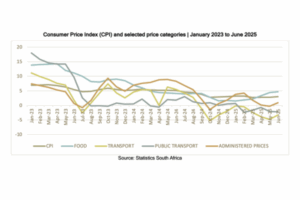Long-serving Chairperson of the Labour Research Service (LRS) Board, Nyaniso Siyana, reflects on the organization’s impact, the state of workers’ education, and the trade union movement in South Africa. As a veteran unionist, Nyaniso has held various leadership roles within the National Union of Metal Workers of South Africa (NUMSA).
What is the role of the LRS Board?
The LRS board plays an oversight role, focusing on ensuring the organisation operates effectively and remains accountable. Our responsibility is not to interfere with the day-to-day work of the Executive Director or the organisation but to support policies that attract and retain talented individuals and valuable partners. Accountability is important, especially when managing donor funds and working with partners. It is also important to ensure that the LRS remains aligned with its mission and vision.
Is the LRS fulfilling its vision and mission?
There is a deliberate effort to ensure that the LRS vision and mission permeate policy and programmatic decisions. The LRS has stayed focused on its vision of being a valued resource base for the labour movement through certain strategic objectives. But there are challenges, including the depressed funding environment affecting nonprofits in South Africa. The LRS is doing its best and managing to weather the storm.
The core work of LRS has a significant and transformative impact. Trade unions have enhanced the ability to represent workers and improve as organisations. Negotiators are equipped for strategic bargaining.
For over three decades, the LRS has been dedicated to supporting the trade union movement through research and education. Unlike other labour support organisations, the LRS is membership-based, and our member unions elect the board of directors. All member unions should use LRS resources and promote its function, while being in good standing. By sharing information and collaborating, we can strengthen our capacities for the benefit of workers.
How do you view the state of worker education today?
The understanding of unionism has evolved since the LRS was established. Previously, workers were keenly aware of the need to join unions for protection and solidarity. Today, unions face challenges in recruiting members who may not fully grasp the benefits of joining a union. Post-1994, there was some demobilisation, and employers have exploited this laxity. However, workers are now increasingly demanding their rights, as evidenced by the rise in strikes compared to the early years of democracy. Unions must continually seek support to renew their organising and bargaining strategies, as reflected in the LRS’s slogan: “Knowledge is too important to leave in the hands of the bosses.” Education remains crucial for equipping workers to handle old and new workplace challenges.
At NUMSA, we have established units to address various themes, including collective bargaining, disciplinary hearings, and mediation. We maintain a focus on political education to elevate the consciousness of workers. Through vibrant political forums, workers discuss issues and develop responses. Our primary role is to defend and support workers’ struggles for their rights.
Unions need credible, independent support organisations to foster strategic thinking in a rapidly changing context. We need to move beyond mere rhetoric and ensure that education and policies are implemented.
The LRS board comprises the Executive Director and six board members elected by our 15-member unions at an Annual General Meeting. Read the LRS story.







